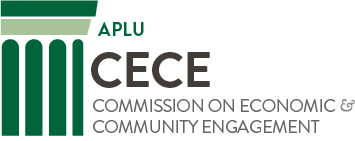
The Commission on Economic and Community Engagement (CECE) is facilitated by APLU’s Office of International, Community, and Economic Engagement (ICEE), both of which were established to lead and coordinate APLU’s mission pillar of “expanding engagement.”
CECE convenes senior university economic development and community engagement administrations, presidents and chancellors, provosts, senior research officers, Cooperative Extension leaders, communications and government affairs administrators, and others across APLU member universities and university systems across North America who maintain responsibility for planning, executing, or communicating their institution’s work in economic development and public engagement. CECE focuses on three key areas of work:
- Talent and workforce development
- Innovation, entrepreneurship, and tech-based economic development
- Place development through public service, outreach, extension, and engagement
CECE members affirm that the development of meaningful and sustainable partnerships, founded on the principles of quality engagement between universities, communities, philanthropies, government, and industry, are key to maximizing the positive impact of the university on the economy and society. These efforts ensure the relevancy of public universities and reclaim public trust in the beneficial impacts of universities at large. ICEE and CECE spearhead projects collaboratively with national and international peer organizations, think tanks, and Washington, DC-based policy stakeholders in addition to other APLU offices, councils, and commissions on issues of mutual interest.
Campus leaders from APLU member institutions may join CECE at this link. Questions on ways to engage? Contact APLU’s Office of International, Community, and Economic Engagement (ICEE).
The Commission engages in five core activities that support, promote, and advance community and economic engagement across APLU universities:



Stay Connected
X (formerly Twitter)
Facebook
YouTube
LinkedIn
RSS